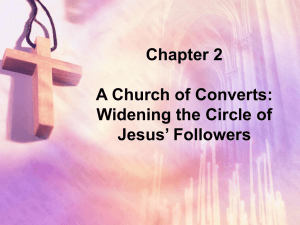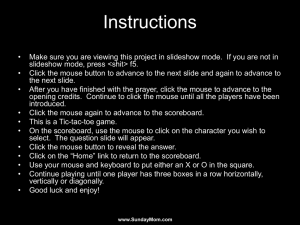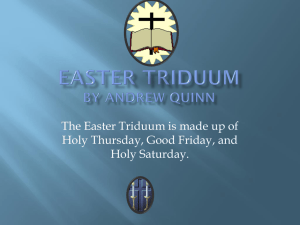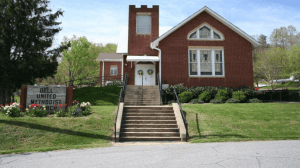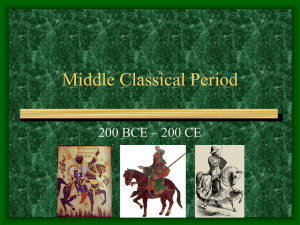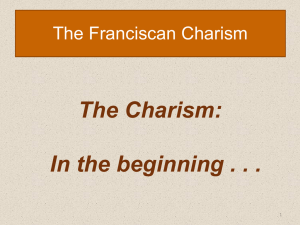Response - Secular Franciscan Order in Western Canada
advertisement
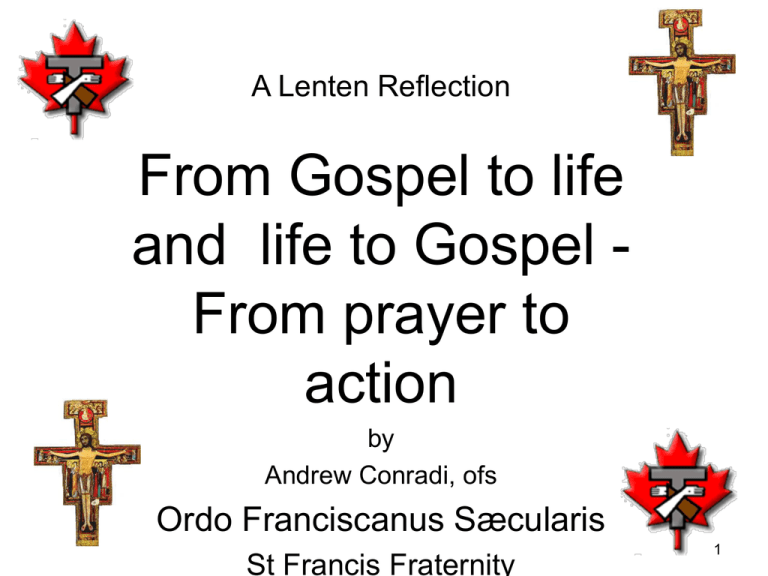
A Lenten Reflection
From Gospel to life
and life to Gospel From prayer to
action
by
Andrew Conradi, ofs
Ordo Franciscanus Sæcularis
St Francis Fraternity
1
2
A Lenten Reflection
Via sacra - Sacred Way
Via crucis - Way of the Cross
Via dolorosa - Way of Sorrows
Stations of the Cross
This presentation is about
the History & evolution of the Way of the Cross.
It shows the relationship between the OFS Rule,
The Tradition of Franciscan Prayer, Lectio divina,
the Divine Office
&
A Scriptural Reflective Way of the Cross in
solidarity with the minores
What do you know about the
Way of the Cross?
What is it?
Why, when and where did it start?
Who started it?
How many stations?
How does it fit into the Franciscan Tradition of prayer?
How and why has it evolved?
What, why, when & where?
It is a prayerful devotion commemorating and
reflecting on the Passion of the final hours of Jesus
and its artistic depiction in pictures, sculpture or
drama and song, whether in church, on stage or
outdoors.
If we cannot go on a pilgrimage to Jerusalem we
can bring Jerusalem to us.
Early Christians started it in Jerusalem.
• In Jerusalem the early Christians and pilgrims
would follow in the actual path of Christ’s
Passion and stop to reflect and pray along the
way at particular places.
• The first Way of the Cross outside Jerusalem
was set up in Italy in the monastery of Santo
Stefano in Bologna in the 5th century.
• The Way of the Cross on the Via Dolorosa is
part of the traditional Easter customs in
Jerusalem.
• The route was formalised by the Franciscans in
the 14th century.
Stations of the Cross
The Way of the Cross is also called the Stations
of the Cross, and was first called that by
William Wey, an English pilgrim
who visited the Holy Land in 1450 and 1462.
Perhaps we should call him
“Wey of the Cross”!
As chapel or church devotion, the tradition
really gained momentum with
St Francis of Assisi (1182-1226)
who also started the tradition of the
Nativity crèche.
He was an innovator and used his imagination!
The Franciscans took over custody of the
shrines in the Holy Land in 1342, and they saw
it as part of their mission to encourage
devotion to the events and places of
the via crucis.
During the 15th and 16th centuries the
Franciscans began to build a series of outdoor
shrines in Europe to duplicate the locations and
commemorate events in the Holy Land.
The number of stations varied between
seven and thirty; seven was common.
In 2012 Franciscans International published a
scriptural reflection entitled “The Seven Last Words of Jesus.”
SOME DATES
In 1686 Pope Innocent XI
granted Franciscans the right to erect stations in all
their churches.
In 1731, Pope Clement XII extended to all churches
the right to have the stations,
provided that a Franciscan priest erected them,
with the consent of the local bishop.
The number of stations was fixed at fourteen.
The chief promoter of this devotion was
Leonard of Port Maurice, ofm (+ 1751)
who set up 572 sets of stations in Italy. Most
famous was the one in the Coliseum, Rome.
In 1857, the bishops of England were allowed to
erect the stations by themselves, without the
intervention of a Franciscan priest, and
in 1862 this right was extended to bishops
throughout the church.
Although the number of stations was fixed at
fourteen in 1731,
modern liturgists have emphasized that
devotion to the Passion is incomplete
without the Resurrection
and have thus fostered the addition of a
fifteenth station “the Resurrection of Jesus.”
Recent evolution of the form
Bl John Paul II introduced a
new form of this prayer, called the
Scriptural Way of the Cross
on Good Friday 1991.
He celebrated that form thereafter
in the Colosseum in Rome.
It could be said that this form is actually more in
keeping with the OFS Rule which “adapts the
Secular Franciscan Order to the needs and
expectations of the Holy Church in the conditions of
changing times.” (n. 3) and which also tells us to
go “from gospel to life and life to gospel” (n. 4)*
N.B. We are on our third rule
A digression - does this evolution of
the Way of the Cross remind you of
the Rosary?
The traditional 15 Mysteries of the Rosary were
standardized, based on long-standing custom,
by Pope St Pius V in the 16th century. The
mysteries were grouped into three sets: the
Joyful Mysteries, the Sorrowful Mysteries, and
the Glorious Mysteries. In 2002 Bl John Paul II
announced a new set of five mysteries - the
Luminous Mysteries or Mysteries of Light.
There are scriptural forms of the Rosary also.
Different sets of Stations
Comparison of
Bl John Paul II’s 1991 set
and
Benedict XVI’s 2007 set
The Traditional Stations of Francis
followed by Bl John Paul II, 1991
1. Jesus is condemned to death (5)
2. Jesus is given his cross (7)
3. Jesus falls the first time
4. Jesus meets His Mother
5. Simon of Cyrene carries the cross (8)
6. Veronica wipes the face of Jesus
7. Jesus falls the second time
8. Jesus meets the daughters of Jerusalem (9)
9. Jesus falls the third time
10. Jesus is stripped of His garments
11. Crucifixion: Jesus is nailed to the cross (10)
12. Jesus dies on the cross (13)
13. Jesus’ body is removed from the cross
14. Jesus is laid in the tomb and covered in incense (14)
Traditional form of Benedict XVI, 2007
1. Jesus in the Garden of Gethsemane,
2. Jesus is betrayed by Judas and arrested,
3. Jesus is condemned by the Sanhedrin,
4. Jesus is denied by Peter,
5. Jesus is judged by Pilate, (1)
6. Jesus is scourged and crowned with thorns,
7. Jesus takes up his cross, (2)
8. Jesus is helped by Simon to carry his cross, (5)
9. Jesus meets the women of Jerusalem, (8)
10. Jesus is crucified, (11)
11. Jesus promises his kingdom to the good thief,
12. Jesus entrusts Mary and John to each other,
13. Jesus dies on the cross, (12)
14. Jesus is laid in the tomb. (14)
*
Continuing evolution of the Papal Form:
It is not rigid and can and will be changed
Each year a different person is invited to write
the meditation texts for the
Stations of the Cross in the Colosseum in Rome.
Past composers of the Papal Stations include
several non-Catholics.
Now let’s relate lectio divina
with the Franciscan tradition of prayer
Benedict XVI - Verbum Domini
The stages of lectio divina
or reading a biblical passage
Lectio (read) : 'what does the text mean'?
Meditatio (meditation): 'what does the biblical
text say to us'?
Oratio (prayer): 'what do we say to the Lord in
response to his word'?
Contemplatio (contemplation): 'what conversion
of mind, heart and life is the Lord asking of us'?
Actio (action): Putting it into practice.
Lectio divina - the Franciscan Tradition
• In 1548 a Franciscan Friar, St Peter of Alcántara,
published a water-shed book in the area of lectio
divina called "Treatise on Prayer and Meditation". It
became popularly known as the "Golden Book or
Booklet” or “Golden Treatise” and was an early
attempt to propose a scheme for lectio divina.
• After this book was published, many saints – e.g. St
Francis de Sales, St. Ignatius of Loyola, St Alphonse
Ligouri, wrote their own schemes for lectio divina.
Thanks to Bro Gerry Clyne, OFM for bringing The Golden Booklet to my attention
Liturgy of the Hours/Divine Office
Let us look at the scheme proposed in the
Golden Booklet and ask ourselves:
is it not also a good way to approach not
just lectio divina as a stand alone practice
but also the biblical readings in the
Divine Office as well as the readings in a
Scriptural Way of the Cross?
If so then
it can be said that meditation in the
Stations and meditation in lectio divina
and going from gospel to life are a
wonderful fit with Franciscan tradition
and the OFS Rule.
Structure of
Lectio divina in The Golden Book
1. Preparation of self for prayer
2. Reading
3. Reflection - Form a mental picture of what is
read - if the passage lends itself. Use your
imagination - but don't get too caught up in detail
that might distract. Draw out a lesson for your life.
Create a resolution based on the lesson*
4. Thanksgiving
5. Offering - Offer self to God*
6. Petitions
* (an action as Benedict XVI might say?)
Benedict XVI:
"The process of 'lectio divina' is not concluded
until it arrives at action ('actio'), which moves
the believer to make his or her life a gift for
others in charity.”
And we Franciscans can say this is similar to
Clare’s final stage in her path to prayer.
Franciscan Prayer
As Sr Ilia Delio, osf, reminds us about
Clare’s path of prayer in Franciscan Prayer :
gaze, consider, meditate, imitate
we are called to engage in society by
imitating Christ through action
after reflection or meditation on the reality
we see around us. This requires us to
become aware of what is happening
around us (signs of the times) and to pray
about it.
Ilia Delio, osf
“To know God is to know the world as it truly is in
the depth of reality.” (p15)
“As Francis deepened his life in prayer, his
understanding of himself and the world around him
began to change. The grace of God turned him in a
new direction, ….” (p31)*
Compassion – Living in the Spirit of St Francis, St
Anthony Messenger Press, Cincinnati, 2011
*In scriptural prayer with reflection on present day
JPIC situations this can also happen to us
Through JPIC action stemming from
prayerful meditation we can unite and
bring to fruition all the following seven
articles from
the OFS Rule
by the process of “See, judge, act”
through Lectio divina and following
Clare’s path to prayer
leading us to imitate Christ
– SEE - going “from gospel to life and life to gospel” (n. 4)
– JUDGE - “so let prayer and contemplation be the soul of
all they are and do” (n. 8)
– JUDGE - “Mindful that they are bearers of peace which
must be built up unceasingly” (n. 19)
– ACT - “we give birth to Him through a holy life” (or
activity/work?) (Prologue: Exhortation of St Francis)
– ACT - “strive to create conditions of life worthy of
people redeemed by Christ” (n. 13)
– ACT - “be in the forefront in promoting justice” (n. 15)
– ACT - “respect all creatures, animate and inanimate,
which bear the imprint of the Most High” (n. 18)
How can we integrate all this through
prayer?
One way is to pray a scriptural Way of the Cross.
How many of you have prayed a scriptural Stations of
the Cross in solidarity with the minores and peace and
creation so dear to Franciscans’ hearts?
Franciscans International published a
scriptural Way of the Cross a couple of years ago.
The Commissariat of the Holy Land in Canada has one
also and so do other congregations.
.
Let us pray one today!
In the Solidarity Way of the Cross
that we are about to pray,
the story of the passion of Jesus is placed in a contemporary
context and “adapts the Secular Franciscan Order to the needs
and expectations of the Holy Church in the conditions of
changing times.”( OFS Rule n. 3) so as to go “from gospel to life
and life to the gospel” today (OFS Rule n. 4).
It’s a powerful critique of social sins and structural injustice in our
own times – sins that mirror those of the powers responsible for the
crucifixion of Jesus.
We, who would be disciples, are
called to apply the message of the sacred story
in our own lives, times and places
(OFS Rule nn. 13, 15, 18, 19).
We are eyewitness to the destruction of our
Earth. We have stood by as natural resources
have been exploited and wasted. Because our
planet and all creation are gifts from God, we
must care for them and see the beauty of God
through them. As Franciscans we have a kinship
with creation as Francis’ “Canticle of the
Creatures” and Bonaventure’s concepts of the
“Book of Creation” and “contuition” and Clare’s
path to prayer attest.
“Cry of the Earth, cry of the Poor”
Eco-justice links sustainable care of creation
with justice and peace.
We can sign a Development and Peace
declaration of solidarity with farmers in the
global south.
Following are two slides that can help us
understand
Ecological Justice:
The integration of sustainable
stewardship of the earth with the
struggle for justice for the poor
In other words: to practice ecological
justice is to listen to the
“cry of the earth and cry of the poor”
and then act accordingly
D&P affirmation and solidarity message
We affirm our responsibility to future generations to
seek genuine solutions to the problem of climate
change that are viable, truly sustainable and do not
sacrifice the poorest people on the planet.
By signing this card, you are expressing your solidarity
with small-scale farmers who urgently request the
promotion of agricultural models that will enable them
to feed their communities, participate in the fight
against climate change, and improve their living
conditions.
The following Solidarity Way of the Cross is an
adaptation by the Canadian Catholic
Organization for Development & Peace of one
by the Maryknoll Sisters and follows the stations
first chosen by St Francis of Assisi with the
addition of the Resurrection.
The scriptural passages and reflections follow
the theme of the
“Cry of the earth, cry of the poor are one.”
From the OFM, a reminder why we
pray a Scriptural & Reflective
Way of the Cross :
“The journey undertaken by Jesus during
his Passion can inspire communities to
discern connections
between world events and
what Jesus suffered
with so much patience and dignity.”
Commissariat of the Holy Land in Canada
How?
by going from gospel to life
by reflecting on actual situations of injustice
by listening to the cry of the poor & cry of the earth
by prayer and engaging in concrete actions in
solidarity with the poor and creation
But first another relationship:
with the Eucharist
From Yvonne Bergeron
49th Eucharistic Congress, Québec 2008
THE TESTAMENT OF JESUS
• Jesus said: “Do this in remembrance of Me.”
• Remembrance of what?
Jesus’ entire life was marked by:
• Profound solidarity with the marginalised
• Denunciation of the unjust social, economic,
political and religious conditions
• Refusal to accept injustice that created
divisions in society
• Human relationships based on love, liberty
and dignity
• Preaching of authentic worship
• Willingness to confront the powerful
Two paths for meeting Jesus
•Sharing with the poor (reality and oriented toward
practice)
•The Eucharist (real and directed toward an
expression of faith)
•These two Paths are inseparable
(I would add like Contemplation and Action)
Try to remember when we receive the Body of Christ :
“Behold what you are,
Become what you receive.”
(St Augustine)
Remembering Jesus of Nazareth
leads us to imagine the future differently
The Eucharist confirms the invitation to commit
ourselves to the continuous movement
to reorganize society so that
it more closely resembles the Kingdom.
First Station
Jesus is
condemned to
death
Response: We long
for justice that
protects the whole
Earth community.
We believe that
another world is
possible.
Second Station
Jesus carries His
cross
Response: We long for
justice that protects
the whole Earth
community. We
believe that another
world is possible.
Third Station
Jesus falls the
first time
Response: We long for
justice that protects the
whole Earth community.
We believe that another
world is possible.
Fourth Station
Jesus meets his
mother
Response: We long
for justice that
protects the whole
Earth community.
We believe that
another world is
possible.
Fifth Station
Simon of
Cyrene helps
Jesus to carry
his cross
Response: We
long for justice
that protects the
whole Earth
community. We
believe that
another world is
possible.
Sixth Station
Veronica
wipes the
face of Jesus
Response: We
long for justice
that protects
the whole
Earth
community. We
believe that
another world
is possible.
Seventh
Station
Jesus falls the
second time
Response: We
long for justice
that protects
the whole Earth
community. We
believe that
another world
is possible.
Eight Station
Jesus meets
the women
of Jerusalem
Response: We long
for justice that
protects the whole
Earth community.
We believe that
another world is
possible.
Ninth Station
Jesus falls a third
time
Response: We long
for justice that
protects the whole
Earth community. We
believe that another
world is possible.
Tenth Station
Jesus’ clothes
are taken away
Response: We
long for justice
that protects the
whole Earth
community. We
believe that
another world is
possible.
Eleventh Station
Jesus is nailed to
the cross
Response: We long for
justice that protects
the whole Earth
community. We
believe that another
world is possible.
Twelfth Station
Jesus dies on the
cross
Response: We long
for justice that
protects the whole
Earth community.
We believe that
another world is
possible.
Thirteenth Station
The body of Jesus
is taken down from
the cross
Response: We long for
justice that protects
the whole Earth
community. We
believe that another
world is possible.
Fourteenth Station
Jesus is laid in the
tomb
Response: We long for
justice that protects
the whole Earth
community. We
believe that another
world is possible.
Fifteenth Station
The Resurrection of Christ
Raphael, 1502
Response: Loving God who provides for
all people at all times, we are frightened
by the signs of ecological crisis,
encouraged by signs of hope, and
compelled by the urgency of both.
Thus, we commit ourselves to the works
of repentance – to reparation, redress,
revaluing. We commit ourselves to an
ongoing journey – a living faith, a sign
of freedom, a mark of discipleship.
In the spirit of community, mindful of
truth ever exceeding knowledge, we
covenant to live in a manner explicitly
informed by the Gospel we proclaim.
Amen.
Share Lent
Next Sunday is Solidarity Sunday when the SHARE LENT
collection is taken for Development and Peace.
• Please be generous and consider also Share YearRound – monthly giving
• Development and Peace’s monthly giving program
allows you, for only a few cents a day, to make a real
difference in the struggle our partners face in the
Global South.
• By becoming a Share Year-Round member, you help
the most marginalized people of the world take control
of their lives and build a better future.
• At Development and Peace, every donation is
important and it goes directly towards helping to
achieve justice and peace in the world.
Pax et bonum - Thank you - Merci


